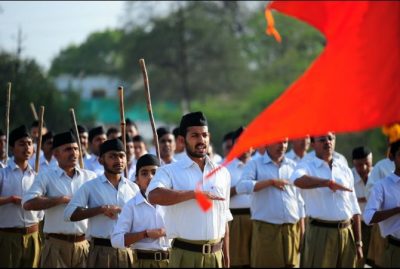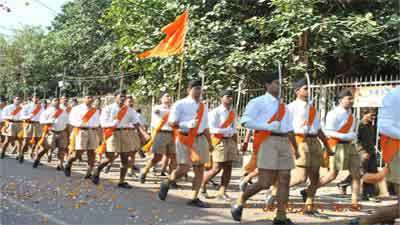By
Ratnesh Dwivedi
RSS – Rashtriya Swayamsevak Sangh initiated movements be they social-reformist or anti-secessionist – evoke a ready response and approbation from the common multitudes as well as from vast numbers of the elite of different shades.
It has increasingly been recognized that the Sangh is not a mere reaction to one or another social or political aberration. It represents a corpus of thought and action firmly rooted in genuine nationalism and in the age old tradition of this country.
No other movement or institution has attracted such vast numbers of adherents, several thousands of them making social work their life’s mission, whose character and integrity are not doubted even by their most virulent critics.
As a movement for national reconstruction totally nurtured by the people, Sangh has no parallel in Bharat or elsewhere. Whether the victims are christians (in Bengal) or Muslims (in J & K), RSS members were first to come to their rescue and reform their lives in natural calamities.
RSS, Rashtriya Swayamsevak Sangh FACT
No other organisation in the world but RSS (Rashtriya Swayamsevak Sangh) must claim to be the most reachable, approachable and patriotic organisation for the public at large.
RSS (Rashtriya Swayamsevak Sangh) is the only such organisation where there is equality among members, harmony of which even close knitted families can be envious.
The legacy which RSS carries is the reason why even several foreigners and Muslims who became members to spy the functioning of the organisation came forward later to make statements that RSS is the best and one of the most patriotic organisations; which teaches how to lead life peacefully while helping poor people at the time of their distress. Helping each and every one without even asking for favours or money. And the world should take lessons from RSS.
RSS, Rashtriya Swayamsevak Sangh History
M.K. Gandhi wanted to garner support from all associations and organisations for the struggle for freedom. During M. K. Gandhi’s visit to a RSS Camp accompanied by Mahadev Desai and Mirabehn at Wardha in 1934, he commented “When I visited the RSS Camp, I was very much surprised by your discipline and absence of untouchablity.” He personally inquired to Swayamsevaks and found that they were living and eating together in the camp without bothering to know their castes. He further said that “Congress should learn few ethics from RSS, the way they give mutual respect to all its members. They should also take note of how to spread knowledge of peace while adhering to principles of brotherhood taught in Hinduism.”
Dr Bhimrao Ambedkar, who was dejected by the way Congress was treating Dalits and their issues, while visiting the RSS camp at Pune in 1939, observed that Swayamsevaks were moving in absolute equality and brotherhood without even caring to know the caste of others. In his address to the Swayamsevaks, he said that “This is the first time that I am visiting the camp of Sangh volunteers. I am happy to find absolute equality between Savarniyas (Upper cast) and Harijans (Lower cast) without anyone being aware of such difference existing.” When he asked Dr Hedgewar whether there were any untouchables in the camp, he replied that there are neither “touchables” nor “untouchables”, but only Hindus.
It is noted that RSS is taking a lead role in providing the education to people of rural India and socially backward classes living under extreme poverty. Dr Bhimrao Ambedkar always repeated his praise in various future speeches while citing the brotherhood example of RSS, Sangh Parivar. The unity among people seen in RSS members touched his heart to the core.
Field Marshal Cariappa in his speech to RSS volunteers said “RSS is my heart’s work. My dear young men, don’t be disturbed by uncharitable comments of interested persons. Look ahead! Go ahead! The country is standing in need of your services.”
Dr Zakir Hussain, the former President of India, once told Milad Mehfil in Monghyar on 20 November 1949 “The allegations against RSS of violence and hatred against Muslims are wholly false. Muslims should learn the lesson of mutual love, cooperation and organization from RSS. The way RSS cadres remain calm and at peace even while dealing with crisis is commendable. They never have any kind of hatred feeling for any human being and serve all.
Noted Gandhian leader and the leader of the Sarvoday movement, Jayaprakash Narayan, who earlier was a vocal opponent of RSS had the following to say about it in 1977 “RSS is a revolutionary organization. No other organization in the country comes anywhere near it. It alone has the capacity to transform society, end casteism and wipe the tears from the eyes of the poor.” He further added “I have great expectations from this revolutionary organization which has taken up the challenge of creating a new India.”
For their selfless welfare work for 1963 war victims and army personnel, Prime Minister Pandit Nehru felicitated them personally and asked them to join the republic day parade along with the army squad and appreciated their efforts to work for the upliftment of India; irrespective of caste, creed and race.
In 1967, Jahanara Imam, said “If RSS was as powerful as Congress then partition of India and Pakistan would not have happened, and innocent killings had been avoided.”
RSS, Rashtriya Swayamsevak Sangh Charity And Welfare
Since the inception of RSS, the mission was to support poor people and victims of contingent situations; whether climatic or crisis. This is a long and continuous tradition known with the RSS (Rashtriya Swayamsevak Sangh). The RSS was instrumental in relief efforts after the 1971 Orissa Cyclone and the 1977 Andhra Pradesh Cyclone.
An RSS-affiliated NGO, Seva Bharati, has adopted thousands of children to date (irrespective of religion – 65% Muslims rest Hindus, Sikhs and Christians) from militancy affected areas of Jammu and Kashmir to provide them education at least up to Higher Secondary level. They have also taken care of many victims of the Kargil War of 1999.
RSS Swayamsewaks were first to come forward for the Bhopal gas tragedy victims, they were first to arrive for the Latur earthquake victims. RSS members are known to be present everywhere; whenever natural calamity strikes.
The RSS assisted in relief efforts quite extensively during the 2001 Gujarat earthquake. They helped rebuild villages. They “earned kudos” from many varied agencies and sources for their actions. For instance, in the 2001 Gujarat earthquake, K. Srinivas, District Collector of Ahmedabad, Indian newsmagazine Outlook and India Today reported:
This is an old tradition in the RSS. To be the first at any disaster strike: floods, cyclone, drought and now quake. In Kutch, too, the RSS was the first to reach the affected areas. At Anjar, a town in ruins, the RSS was present much before the Army took the lead in finding survivors and fishing out the dead.
—K. Srinivas, District collector, Ahmedabad
Literally within minutes RSS volunteers were at the scenes of distress. Across Gujarat, the (RSS) cadres were the saviors. Even as the state machinery went comatose in the first two days after the quake, the cadre-based machinery of the Sangh fanned out throughout the state. Approximately 35,000 RSS members in uniform were pressed into service.
—Outlook.
It is conceded by even their worst detractors that the RSS has been in the forefront of the non-official rescue and relief (operations). This has led to an upsurge of goodwill for the Sangh
—India Today.
Seva Bharati conducted relief operations in the aftermath of the 2004 Indian Ocean earthquake. Activities included building shelters for the victims amd providing food, clothes and medical necessities. The RSS assisted relief efforts during the 2004 Sumatra-Andaman earthquake and the subsequent tsunami.
In 2006, RSS participated in relief efforts to provide basic necessities such as food, milk and portable water to the people of Surat, Gujarat who were affected by massive floods in the region.
The RSS volunteers carried out massive relief and rehabilitation work after the floods ravaged North Karnataka and some districts of the state of Andhra Pradesh.
According to Cho Ramaswamy, the editor of Tughlaq magazine, the RSS-sponsored Seva Bharati did yeoman service following the 2004 Indian Ocean tsunami, despite a lack of formal acknowledgment.
The Only Organisation To Support Sikhs In 1984 Riots
When no organisation came forward to support Sikh victims in the 1984 riots conducted by Congress under the leadership of Rajiv Gandhi (who ignored the massacre of thousands of innocent Sikhs at the hands of Congress people and made the irresponsible statement – When a big tree falls, the ground shakes). RSS was the only organisation to come forward and wholeheartedly support Sikh victims.
RSS helped protect Sikhs during the 1984 anti-Sikh riots. Sikh intellectual and author of ‘A History of the Sikhs’, Khushwant Singh, credits members of the RSS with helping and protecting Sikhs who were being targeted by members of the Congress (I) party under Rajiv Gandhi leadership during the riots.
RSS has played an honorable role in maintaining Hindu-Sikh unity before and after the murder of Indira Gandhi in Delhi and in other places It was the Congress (I) leaders who instigated mobs in 1984 and got more than 3000 people killed. I must give due credit to RSS and the BJP for showing courage and protecting helpless Sikhs during those difficult days. No less a person than Atal Bihari Vajpayee himself intervened at a couple of places to help poor taxi drivers.
—Khushwant Singh
RSS respects the country as mother land and always thought of blending all Indians; Hindus, Muslims, Christains, Sikhs as an integral part of Indian culture. RSS always worked for the people of India and would continue to work for their development. The only sad part is they never carry promotional campaigns of their work. It’s their way of working that they believe in selfless welfare for the society and people. Such is the simplicity of selfless volunteers of RSS – who are truly patriotic heroes of India. All the people who benefited come forward and acknowledge good work done by RSS (Rashtriya Swayamsevak Sangh).
The RSS prayer emits fragrance of global brotherhood and harmony among Indians thereby willing to sacrifice everything for the motherland. Saluting motherland – pledging to protect, respect for the welfare of Bharat and residents.
RSS Sangh Parivar Prarthana In English:
Forever I bow to thee, O Loving Motherland! O Motherland of us (Indians) Hindus, Thou hast brought me up in happiness. May my life, O great and blessed Holy Land, be laid down in Thy Cause. I bow to Thee again and again.
We the children of the Hindu Nation bow to Thee in reverence, O Almighty God. We have girded up our loins to carry on Thy work. Give us Thy holy blessings for its fulfillment. O Lord! Grant us such might as no power on earth can ever challenge, such purity of character as would command the respect of the whole world and such knowledge as would make easy the thorny path that we have voluntarily chosen.
May we be inspired with the spirit of stern heroism, that is sole and ultimate means of attaining the highest spiritual bliss with the greatest temporal prosperity. May intense and everlasting devotion to our ideal ever enthuse our hearts. May our victorious organised power of action, by Thy Grace, be wholly capable of protecting our dharma and leading this nation of ours to the highest pinnacle of glory.
Ratnesh Dwivedi
Ratnesh Dwivedi transferred his skills of the Media Industry into his passion for writing, teaching and commenting on Global Affairs. He has seen the changing face of global politics as a budding media professional who regularly commented on the changing equation between the U.S., Middle East and South Asia. Later he continued his association as an Analyst and Researcher on Global Politics through his association as Charter Member of the Bush Presidential Center,Texas.
Apart from his association with the Bush Center, Ratnesh Dwivedi is associated with several other organizations such as-ECREA-Brussels-Member, Institute of English Studies, University of London-Member, Mission Essential-Virginia-Member, Carnegie Council-Washington-Member, American Astronomical Society-Washington-Member, Internet Society-Virginia-Member, CSIS-PONI-Wshington-Member, RTDNA-Wshington-Member, NSTA-Virginia-Member. He has authored five books. The Story of an Intern-Reportage, The Cosmic Mask -Space Fiction. Third and fourth are awarded academic books. His fifth book on US Intelligence and Cost of War is released world wide on November 7,2015. Ratnesh Dwivedi bears the honor of attending several high rated workshops of NASA and continuously follows NASA updates since 2003.
He has been associated with Amity University, where he led a project to set up Community Radio Station and TV Studio apart from his teaching assignment. He is a widely published academician in the field of Media and Communication with nearly 30 publications and presentation in countries like Russia, Ukraine, Kazakhstan, Germany, Slovinia, Czech, Britain, USA, Norway and India with nearly 10000 downloads, which itself is a record.
He is Asst. Professor of Journalism at Teerthankar Mahaveer University in India.He is Consultant with EEUA, Moscow and a NJ, USA based Energy Firm. He is on Board of Directors and serves as VP-Global Media Marketing with Transitional Assistance, USA, which works for veterans of US Army. He lives in New Delhi with his wife and son.




No Comments Yet!
You can be first to comment this post!